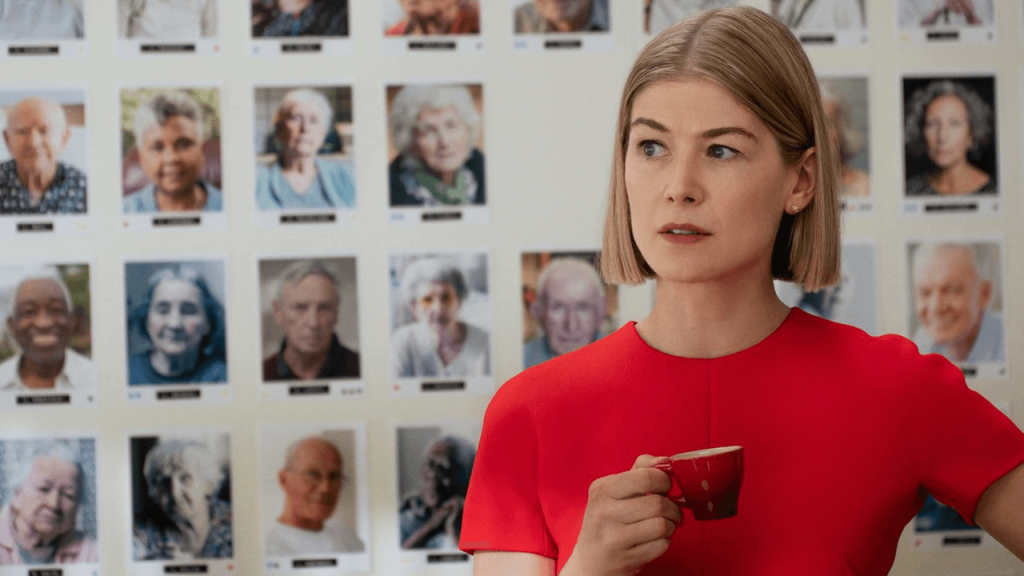Actress Rosamund Pike is having a lot of fun promoting her movie I Care a Lot. But her career bright spot has a dark side. In her speech after winning a Golden Globe for her performance, she half-joked: “Maybe I just have to thank America’s broken legal system for making it possible to make stories like this.” Pike was referring to guardianships, and she had it wrong. The system isn’t broken (at least in Arizona), but it’s also not perfect.
There’s More to the Story
In the movie, Pike plays Marla, a ruthless scammer who preys on elderly people by manipulating the guardianship system in a fictional jurisdiction. That’s one problem with the film. It suggest all states are the same, and they’re not. Each state has its own laws and procedures, some more stringent than others. Those promoting the film say abuse is running rampant nationwide, and a number of news reports just repeat their exaggeration.
But consider: the number of people under guardianship is estimated to be 1.3 million. The filmmakers all point to just one bad apple case: April Parks, a guardian in Nevada who was ultimately sentenced to 16 to 40 years in prison. Parks was indeed awful. But there are thousands of other guardians out there working very hard to provide an important service in our communities.
In Arizona, We Have Licensing
Arizona has what we think is a pretty good system of licensing professionals who serve as guardian and other “fiduciary” roles. A licensed fiduciary (full disclosure: Fleming & Curti is one of them) must follow statutes and regulations, obtain continuing education, respond to complaints, and submit to compliance audits.
Those under guardianship have been deemed legally unable to manage their affairs, and professional fiduciaries or the public fiduciary step in when there is no one else available. The people guardians serve, called “wards” (a term we find unappealing), typically have serious, debilitating conditions: chronic mental illness, severe dementia, serious developmental disabilities or severe, life-altering injuries.
We Also Have Lots of Protections
Because guardianships do strip people of their right to make decisions on their own, the court proceeding to obtain one involves a lot of people and procedure. That’s the biggest problem with I Care a Lot. The movie leaves out most of the procedures that protect people (and the system) from abuse. Of course, if Marla faced obstacles, the movie would have been a lot less entertaining. And a lot longer than an hour and 58 minutes. We get that. But viewers should know, it’s not like that in real life.
In Marla’s story, her scheme gets rolling when a doctor scammer offers up her patient, Jennifer (Dianne Wiest), as a good candidate for guardianship because she is rich and has no family. In real life, the doctor would have to submit a sworn report to the judge. The report describes in detail the alleged incapacitated person’s condition. Doctors have ethical standards, and medical professionals are busy. They don’t have time for such reports and, in our experience, don’t do them unless they believe their patient needs help.
More People and Procedures
If a scammer were able to obtain a convincing doctor’s report, there’s more.
The person who is allegedly incapacitated is entitled to an attorney to represent his or her point of view. If she doesn’t have an attorney, the court appoints one. If the client doesn’t want a guardian, the attorney must present their point of view — even if it’s clear having a guardian is in the person’s best interest. In the movie, Jennifer’s attorney is absent during the entire guardianship process.
In addition, an independent investigator is appointed to report to the judge to make recommendations regarding 1) whether the person needs a fiduciary, and b) whether the person who is asking to be appointed (the “Petitioner”) is the right person. The investigator interviews the Petitioner, family, friends, doctors, caregivers, and more. She then submits a written report of her findings.
Furthermore, the Petitioner must give notice. The spouse, parents, and adult children, and if none, others close to the person get information about the proceeding and can object.
Marla obtains an “emergency” guardianship, which explains some of the abbreviated procedure in the movie. Those can happen in Arizona, too. But they are always temporary and followed by a “permanent” hearing, with all of the procedures above.
Room for Improvement
Is the system perfect? Of course not. All of these protections come at a literal price. All of these people involved are supposed to get paid. That means the process can be very expensive and can deter loved ones who want to help. Many decide they can’t afford it.
Doctors, attorneys, investigators, and judges are busy and human, and they may not always treat every case with the care it deserves.
And being a guardian can be taxing. Many fiduciaries don’t have adequate support or training. There is licensing and continuing education available. But there’s no hands-on fiduciary school where people learn how to do the job on a daily basis.
But We Still Care a Lot
Still, most guardians, and the judges that oversee their work, are committed to their work. They help their wards get better and end the guardianship if they do. And if they don’t get better, guardians do all they can to enhance the quality of life for those they serve. They help people live as independently as possible, ensure they receive proper care, stay safe, and retain as much dignity as possible, both during life and at death.
In real life, most guardians do, genuinely, care a lot.



